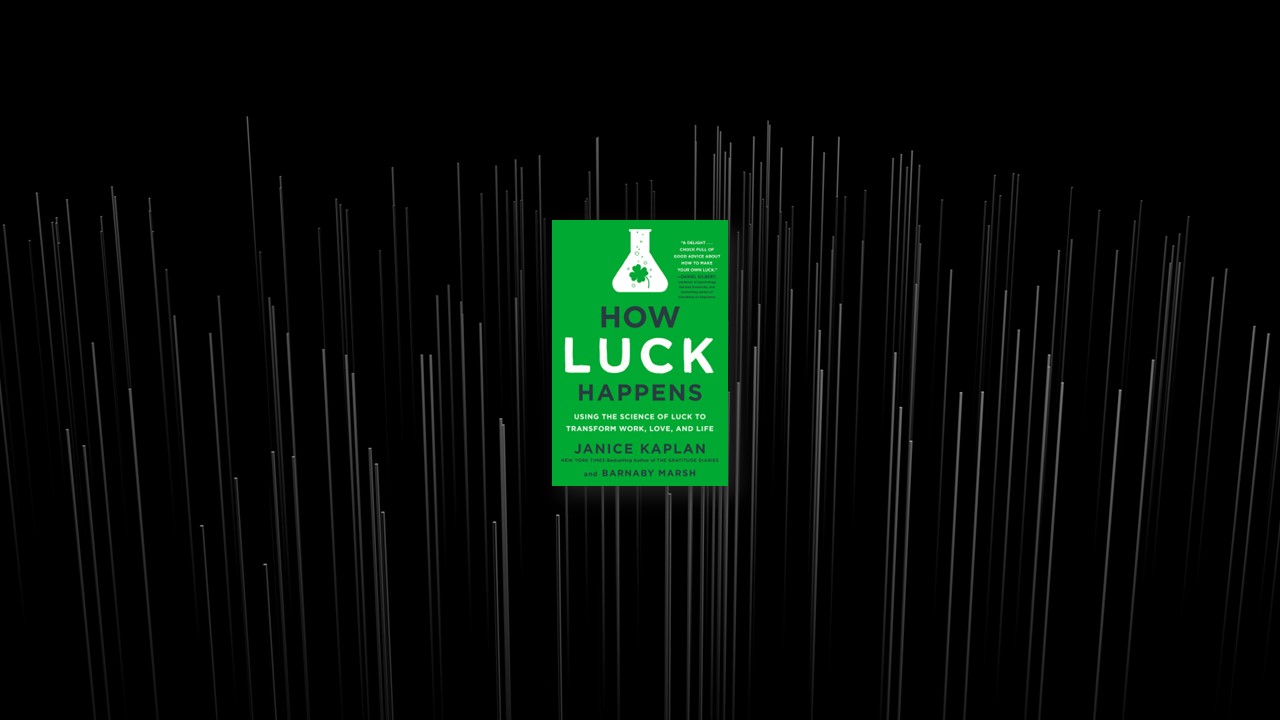Some People Have All the Luck… And You Can Be One of Them
The most important talent anyone who seems lucky possesses is a very basic one—the ability to pay attention and notice opportunities. A great example of how easy it is to miss something important comes from the psychologists Christopher Chabris and Daniel Simons, who met some twenty years ago at Harvard University and began doing research on attention and perception. They created a now-famous video in which six college-age men and women, half in black T-shirts and half in white ones, are moving around, and you’re asked to count how many times the players wearing white shirts pass the basketball.
Okay, you can do this. You focus carefully on the players in white and watch the ball. At the end of the short video, the announcer’s voice asks how many passes you counted. If you get the correct answer of fifteen, you probably pat yourself on the back. Good observing! But the next question may change your mind: “Did you see the gorilla?”
Um . . . the gorilla? Halfway through the game, a person in a gorilla costume came to the middle of the screen, beat his chest, and walked off. Whoops. In experiments that have been done over and over with people of all ages and backgrounds (starting with Harvard students), at least half miss the gorilla. If you haven’t seen the video, you’re probably convinced that of course you would see the gorilla. Everybody thinks that. But you get so busy counting passes that you simply miss the other action that’s happening right in front of you.
All of us are bombarded each day with millions of bits of information, and we get lucky when we know where we want to focus—or which possibilities we want to fire up. Estimates vary, but big-data analysts at IBM say we create some 2.5 quintillion bytes of data every day—which you can write out as 2,500,000,000,000,000,000, if that helps you see just how big a number we’re talking about. Needless to say, we’re not built to take in even the tiniest fraction of that. Possibilities abound in every direction, and if you wait for one of those bytes or possibilities or bits of stimulus to turn into luck, you’re sure to miss it. As with the gorilla video, you have to know where you’re looking—because it takes looking in the right place to get lucky.
Skate to Where the Puck Will Be
Gretzky was on four Stanley Cup–winning teams in the 1980s and 1990s and set extraordinary scoring records that still stand. When he was asked to explain how he scored so many goals, he always had one answer: “I skate to where the puck will be.”
In trying to figure out how to skate to where the puck will be, it helps to listen to the full advice Gretzky got from his hockey-obsessed dad. Even though Gretzky was naturally talented from a young age, his dad drilled him on the essentials of the game. In his autobiography, Gretzky reported that their conversations would go like this:
Dad: Where’s the last place a guy looks before he passes it?
Young Wayne: The guy he’s passing to . . .
Dad: Where do you skate?
Young Wayne: To where the puck is going, not where it’s been.
It’s easy to understand that you want to skate to where the puck will be, but the second part of that sentence is equally important. You don’t want to skate to where the puck has already been. In looking for luck or success, it’s natural to go where others have already found it. You may find it there—scientists tell us that lightning absolutely does strike twice in the same spot—but it’s also possible that the biggest luck opportunities will have moved on. Everybody else is clustering in the previously lucky area, so you might do well to try to figure out where that puck is going.
He had one other insight that works in life as well as hockey—“You miss 100 percent of the shots you don’t take.” In other words, you can’t get lucky unless you put yourself on the line. And for that, it’s necessary to pull yourself out of a comfort zone (and definitely out of bed) and meet the people who can make one thing lead to another. From the outside, it may look like you’ve been lucky, but you’ve really just skated to where the puck is going next.
Connect to the Power of Other People
The easiest way to expand your luck network may be through social media. It doesn’t take much effort to add a new friend on Facebook or up your number of Twitter posts. But this is only step one, and many studies suggest that online connections don’t really replace face-to-face encounters. When social media guru Sree Sreenivasan used Facebook in his job search, it was just a way to invite people to meet with him in person via his daily walks. The vast majority of people looking for jobs use online sources, and there’s no reason not to. But studies suggest that anywhere from 40 to 80 percent of people land jobs through direct contact with friends, colleagues, and connections. Having coffee with a former colleague may lead to more luck in the work world than another hour on LinkedIn.
The same pattern is true if you’re looking to get lucky in love. Forty million or so Americans now use online dating sites, so these are a good way of expanding your potentially lucky links. But according to a 2016 Pew survey, even among people who have been with their partner for five years or less, fully 88 percent met through real-world connections. That may be changing—a recent survey from Match.com found that 39 percent of people now meet online. You can take these various survey numbers with a grain of salt (if not a whole shaker full), but you also have to remember that meeting is just the first step, and nobody gets married online. After you’ve swiped right on Tinder, you still have to do the face-to-face part: connect for a drink, get to know each other, decide if this is the person who will make you lucky in the future. You can’t miss the overall conclusion that luck comes from connecting directly with other people.
Zig When Others Zag
Mathematician Steven Strogatz has such powerhouse credentials that he could have decided to follow the straight line throughout his career (going from point A to point B, as it were). He has degrees from Princeton, Cambridge, and Harvard and is now a chaired professor at Cornell. But he’s also charming and amusing (not just for a math guy) and believes that you can create luck with the unexpected. One of the sections on his website is called “Fun.” He has written popular math columns for The New York Times and has the best-named mathematics book ever: The Joy of X.
Sometimes the best way to get lucky is to take the most unexpected path of all—and just let yourself have fun. Strogatz is convinced that lucky discoveries happen if you’re willing to be playful. He is as obsessive and hardworking as anybody else in high levels of academia, but he doesn’t overlook the value of having a good time. “When a problem seems like fun, you’ll stick with it and work on it incessantly—you’ll think about it when you’re in the shower or driving the car. And that increases the chance of hitting on lucky good results,” he said. Playful people also try things that nobody else would dare. The sense that they’re just having fun gives them the excuse to try far-out ideas—which leaves them open to new possibilities and (what seems like) good luck.
The Power of Persistence and Passion
A lot of people work hard and don’t get what they want. If you want to be one of the people who have all the luck, you need to nurture both persistence and passion. Those are the great luck-making personality traits, and you don’t have to be born with them. Urging young people to follow their passions is a regular theme of commencement addresses, but the message leaves a lot of new graduates despondent. They don’t yet have a passion, so they wait for the epiphany that will give them one fully formed.
But that’s just not the way it happens. In her book Grit, psychologist Angela Duckworth points out that passion for your work “is a little bit of discovery, followed by a lot of development, and then a lifetime of deepening.” Those commencement speakers would be better off advising that you explore for a while until you find what you care about. Then nurture your interest and decide that you will stick with your approach. At that point, your persistence has the power to bring cascades of luck tumbling in your direction.
How Many Eggs in Your Basket? (And How Many Baskets?)
Nassim Nicholas Taleb, the mathematician and author of Fooled by Randomness and The Black Swan, has spent a lot of time thinking about how to set strategies that can make you lucky in (what he considers) a random world. What he calls “black swan events” are those that seem to come out of nowhere and can’t be predicted—like world wars and stock market crashes and terrorist attacks. Taleb gives the example of a Las Vegas casino that had planned for every contingency on its gambling floor but was almost destroyed by completely unprecedented events—a star performer was mauled by a tiger, an employee hid important records, and an owner’s daughter was kidnapped. Events like these, rare but with an extreme impact, cause disaster for most people who count on the status quo—but can create huge windfalls for others.
Taleb’s view is that if you want to get lucky from black swans, you should invest in the extremes. Think of it as the barbell school of life, in which you stay away from the middle and load up on things at either end that are extremely safe and extremely risky. So, for example, you might squirrel away 90 percent of your savings in something like well-protected Treasury bonds and then put the remaining amount—the amount you’re willing to lose—in extremely high-risk possibilities like Bitcoin or oil wells in Alaska. If you like the idea of the big chance, it’s a good plan. But most of us would rather be a little more cautious. Betting on black swans is one theoretical way to create luck—but if you’re not careful about how much you’re willing to risk, you can end up broke (or crazed with anxiety) long before the black swan appears.


